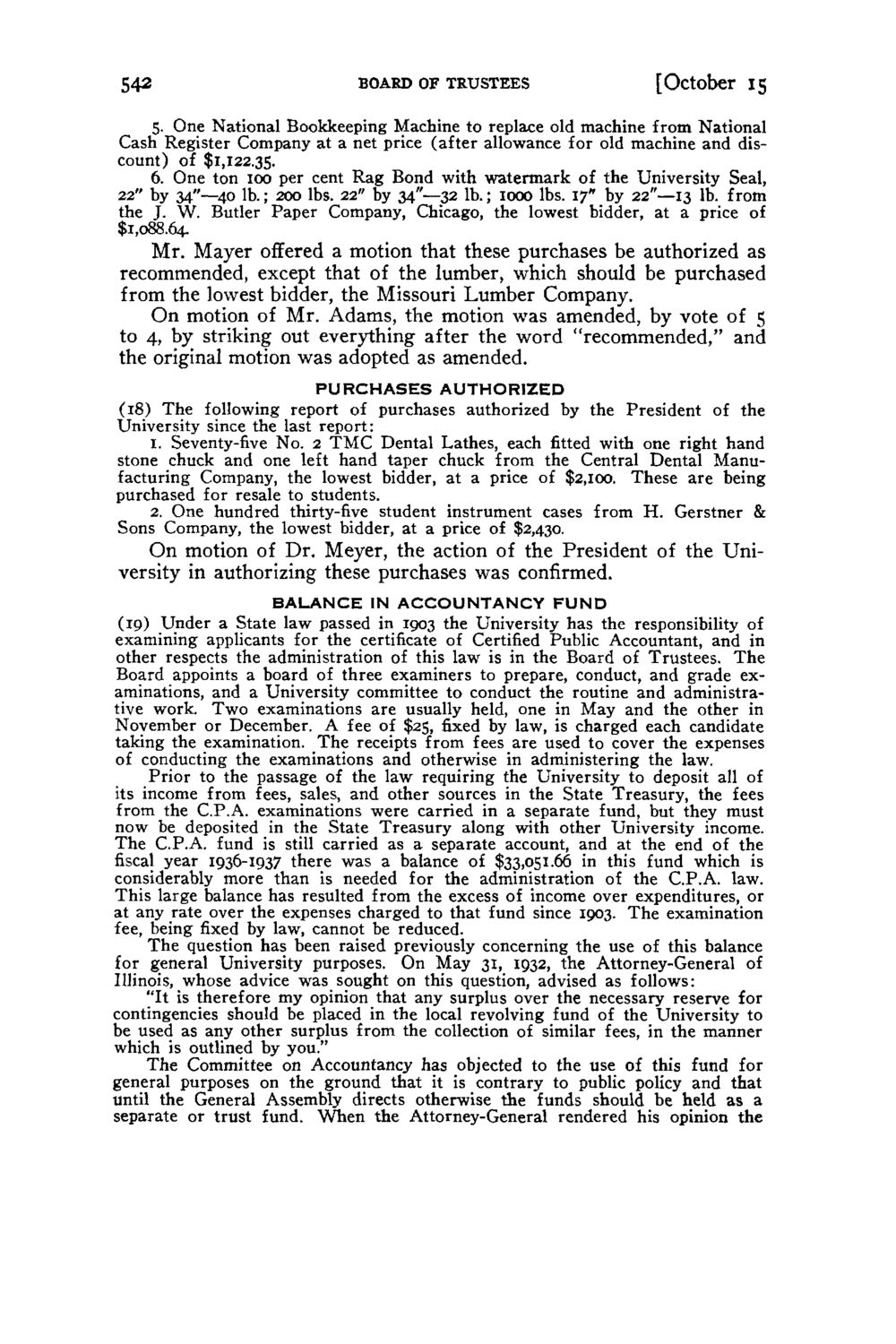| |
| |
Caption: Board of Trustees Minutes - 1938
This is a reduced-resolution page image for fast online browsing.

EXTRACTED TEXT FROM PAGE:
542 BOARD OF TRUSTEES [October 15 5. One National Bookkeeping Machine to replace old machine from National Cash Register Company at a net price (after allowance for old machine and discount) of $1,122.35. 6. One ton 100 per cent Rag Bond with watermark of the University Seal, 22" by 34"—40 lb.; 200 lbs. 22" by 34"—32 lb.; 1000 lbs. 17" by 22"—13 lb. from the J. W. Butler Paper Company, Chicago, the lowest bidder, at a price of $1,088.64. Mr. Mayer offered a motion that these purchases be authorized as recommended, except that of the lumber, which should be purchased from the lowest bidder, the Missouri Lumber Company. On motion of Mr. Adams, the motion was amended, by vote of 5 to 4, by striking out everything after the word "recommended," and the original motion was adopted as amended. PURCHASES AUTHORIZED (18) The following report of purchases authorized by the President of the University since the last report: 1. Seventy-five No. 2 TMC Dental Lathes, each fitted with one right hand stone chuck and one left hand taper chuck from the Central Dental Manufacturing Company, the lowest bidder, at a price of $2,100. These are being purchased for resale to students. 2. One hundred thirty-five student instrument cases from H. Gerstner & Sons Company, the lowest bidder, at a price of $2,430. On motion of Dr. Meyer, the action of the President of the University in authorizing these purchases was confirmed. BALANCE IN ACCOUNTANCY F U N D (19) Under a State law passed in 1903 the University has the responsibility of examining applicants for the certificate of Certified Public Accountant, and in other respects the administration of this law is in the Board of Trustees. The Board appoints a board of three examiners to prepare, conduct, and grade examinations, and a University committee to conduct the routine and administrative work. Two examinations are usually held, one in May and the other in November or December. A fee of $25, fixed by law, is charged each candidate taking the examination. The receipts from fees are used to cover the expenses of conducting the examinations and otherwise in administering the law. Prior to the passage of the law requiring the University to deposit all of its income from fees, sales, and other sources in the State Treasury, the fees from the C.P.A. examinations were carried in a separate fund, but they must now be deposited in the State Treasury along with other University income. The C.P.A. fund is still carried as a separate account, and at the end of the fiscal year 1936-1937 there was a balance of $33,051.66 in this fund which is considerably more than is needed for the administration of the C.P.A. law. This large balance has resulted from the excess of income over expenditures, or at any rate over the expenses charged to that fund since 1903. The examination fee, being fixed by law, cannot be reduced. The question has been raised previously concerning the use of this balance for general University purposes. On May 31, 1932, the Attorney-General of Illinois, whose advice was sought on this question, advised as follows: "It is therefore my opinion that any surplus over the necessary reserve for contingencies should be placed in the local revolving fund of the University to be used as any other surplus from the collection of similar fees, in the manner which is outlined by you." The Committee on Accountancy has objected to the use of this fund for general purposes on the ground that it is contrary to public policy and that until the General Assembly directs otherwise the funds should be held as a separate or trust fund. When the Attorney-General rendered his opinion the
| |